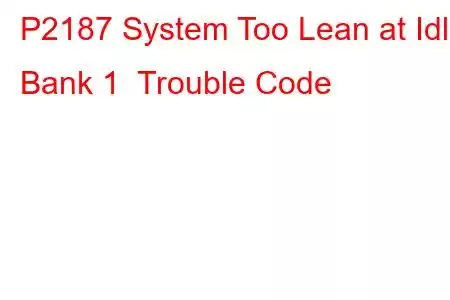P2187 System Too Lean at Idle (Bank 1) DTC
OBD-II Trouble Code Technical Description
System Too Lean at Idle (Bank 1)
What does that mean?
This diagnostic trouble code (DTC) is a generic powertrain code. It is considered generic because it applies to all makes and models of vehicles (1996-newer), although specific repair steps may be slightly different depending on the model. We have seen this code on Hyundai, Dodge, and other models.
This is an ambiguous code in of itself. It can be a tough code to crack without a diagnostic strategy. During the last two starts, the engine management computer has recognized a problem with the fuel mixture at an idle.
It appears that the fuel mixture is too lean (too much air and not enough fuel) at an idle. If you have a 4 cylinder engine the "Bank 1" is meaningless, however, if you have a 6 or 8 cylinder engine, Bank 1 will be on the side with the number one cylinder. Code P2189 is the same code but for Bank #2.
There is a laundry list of components that could cause this scenario. For the most part the diagnostic procedure is not difficult -- just time consuming, unless it is one of the first items checked. The strategy dictates that the driveability problems are observed and noted, then start with the most commonly found problems and progress from there.
Symptoms
With the wide range of possibilities, the problems listed may and may not be present. But, here is where it is important to pay particular attention to the symptoms observed and make a note as to what and when symptoms appear for diagnostic strategy.
Vehicle has a miss at an idle Hard to start, especially when hot Very irregular idle Additional codes to pinpoint cause of original P2187 code Whistling noises Lower turbo boost numbers Fuel smellPotential Causes of P2187 DTC
Faulty O2 sensor (front) Faulty gas cap seal Leaky or loose oil filler cap Air leaking into the intake manifold downstream from the Mass Airflow sensor due to the manifold itself, vacuum hoses off or cracked, leak MAP sensor, Leak at turbo bypass or it's stuck open, power brake booster hose, or a leak in the EVAP system hoses. Faulty MAP sensor EVAP canister purge valve Fuel injector leak Fuel pressure regulator faulty Leaks in the exhaust system Faulty variable camshaft timing Faulty ECM (engine management computer) Faulty O2 preheater (front) Clogged fuel filter Fuel pump wearing out and producing low pressure. Faulty mass air flow sensorDiagnostic / Repair Steps
Your strategy for locating this problem begins with a test drive and observation of any symptoms. The next step is to use a code scanner (available at any auto parts store) and pulling any additional codes.
The computer has set a code P2187 stating that the fuel mixture is lean at an idle. This is the main code, however, any component malfunctioning within this loop that has the potential to cause a lean mixture will also be set in code.
If the test drive doesn't produce any symptoms it is possible that it is not a real code. In other words, the fuel mixture is not lean and that the computer or oxygen sensor is responsible for setting the code.
Every vehicle has a minimum of two oxygen sensors -- one in front of the catalytic converter and one after the converter. These sensors signal the amount of free oxygen left in the exhaust after ignition, which determines the fuel ratio. The front sensor is primarily responsible for the mixture, the second sensor behind the exhaust is used for comparison to the front sensor to determine if the converter is working properly.
If a rough idle is present or one of the other symptoms, begin the process with the most likely cause first. Either unmetered air is entering the intake manifold or there is a lack of fuel pressure:
Check the fuel cap for cracks and sealing and function Lift the hood and make surRead: 32


